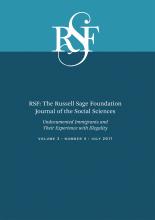Abstract
Despite an increasing visibility of unaccompanied children in the media and among policymakers, little is known about the experiences of unaccompanied children within and beyond immigration detention. Based on a three-year, multi-sited ethnography with migrant children and their families, this paper traces the impact of U.S. institutional sponsorship policies and practices on unaccompanied children and their families. The article delineates several intersecting institutional logics—the universalization of childhood, the pathologization of mobility, and the criminalization of transnational parents—that underpin federal policies and practices for the care and custody of unaccompanied children. The article argues that these policies overflow from the spaces of detention and shape young people’s help-seeking behaviors and sentiments of belonging following release from detention.
- © 2017 Russell Sage Foundation. Heidbrink, Lauren. 2017. “Assessing Parental Fitness and Care for Unaccompanied Children.” RSF: The Russell Sage Foundation Journal of the Social Sciences 3(4): 37–52. DOI: 10.7758/RSF.2017.3.4.03. Research was generously funded by the National Science Foundation and the Wenner Gren Foundation. The author is profoundly grateful to the young people and their families who welcomed her into their lives. Direct correspondence to: Lauren Heidbrink at lauren.heidbrink{at}csulb.edu, 1250 Bellflower Boulevard, Long Beach, CA 90840.
Open Access Policy: RSF: The Russell Sage Foundation Journal of the Social Sciences is an open access journal. This article is published under a Creative Commons Attribution-NonCommercial-NoDerivs 3.0 Unported License.






